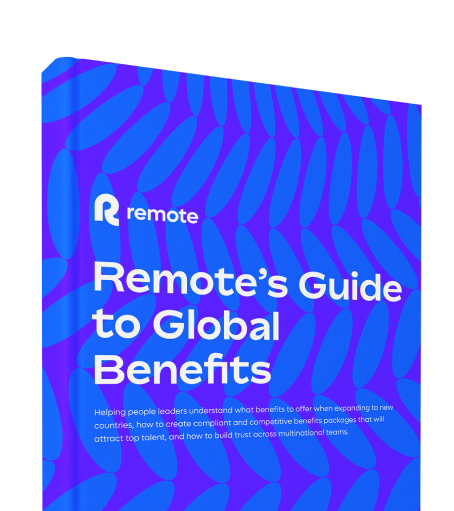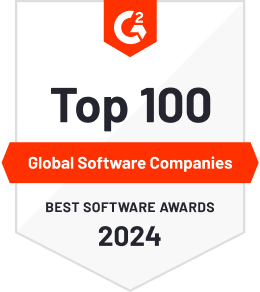
Tax and Compliance — 10 min

Global Payroll — 20 min
An employee stock ownership plan, or ESOP, is a powerful tool to attract and retain great workers for your business. But offering stock options to full-time employees in other countries is a complex process.
To realize the advantages of providing stock options to your international team, you have to plan and execute your ESOP strategy effectively. This means taking into account where your employees live, how you handle their taxes, and what your complete global benefits packages should look like.
In this article, we’ll explain how to create an ESOP and grant stock options to your foreign employees. We’ll cover important definitions and practical steps, and answer the most common questions around sharing equity in your business with your team.
So let’s jump straight in.
An ESOP is a system used by companies to grant employee stock options (ESOs) to their staff. These stock options then give employees the right to purchase a specific number of shares in the company — at a set price.
This price depends on the “strike price” or “exercise price”, which is determined when the options are initially offered to the employee. If the share price is higher than the exercise price, the employee can buy the stock for less than the current price of the shares.
For example, say that your employee receives a stock option grant of 1,000 shares, with an exercise price of $10 per share. If the employee chooses to exercise the option, they must pay $10,000 to receive all 1,000 shares ($10 x 1,000). If the stock is worth more than $10 per share, the employee profits on the difference.
In most cases, employees need to work for a company for a certain period of time before they can exercise their shares. This period is known as the “vesting schedule.”
Companies can structure a vesting schedule in multiple ways. For instance, many startups offer stock options on a four-year vesting schedule, with a one-year cliff. This means the employee does not vest any stock for the first year (the cliff) but, after one year, will then receive 25% of the total stock option grant. After that, the employee would then vest 1/36th of the remaining stock each month for the remaining three years.
Example:
An employee joins your company and, under your ESOP, is granted 200 shares. There is a four-year vesting schedule with a one-year cliff.
Shares vested | Total shares vested | Shares remaining | |
|---|---|---|---|
0 years | 0 | 0 | 200 |
1 year | 50 (i.e. 25%) | 50 | 150 |
2 years | 50 (i.e. 1/36 x 12) | 100 | 100 |
3 years | 50 (i.e. 1/36 x 12) | 150 | 50 |
4 years | 50 (i.e. 1/36 x 12) | 200 | 0 |
After four years, the employee becomes fully vested, and can purchase the entirety of the stock option grant.
To learn more about what an ESOP is and how it works, check out our detailed guide:

Providing stock options to foreign hires is a great way to attract and retain top talent. It also incentivizes good performance, because when the company does well financially, the stock options gain value and the employee benefits.
This is particularly true for foreign workers, as stock options help you stand out from other potential employers. Many organizations are not aware of how to offer stock to employees in other countries and, if this is something you can offer, it can tip the scales in your favor.
Remote's global HR experts share practical advice for building a locally relevant and globally compliant benefits program to help you attract and keep the world's best talent.

Before you start offering stock options to your overseas team members, you need to know which types of equity incentives are the best fit, and — most importantly — whether your team members will be eligible to receive them.
This is because not all employee equity incentives are the same. Stock options, for example, require employees to purchase their shares before they can own them, while employee stock purchase plans (ESPPs) allow employees to make regular investments in their company’s stock at a discounted price. Awards, meanwhile, are stock given to employees for free as an incentive.
Here are some of the most popular types of equity incentives:
ISOs are a type of stock option in the US, and are issued directly from the employer to the employee. They can only be given to employees (not investors), and have a tax-advantaged status in the US.
It’s important to note that the issuer of the ISO must be the recipient’s direct employer. As a result, it’s not possible to issue ISOs using an employer of record (EOR), as an EOR employs workers in other countries on your behalf.
NSOs have a different tax treatment than ISOs in the US. However, unlike ISOs, you can offer NSOs to workers in other countries using an EOR. This allows foreign employees to receive equity in your business legally, the same as your domestic employees.
NSOs are the most common way of offering equity to international team members.
RSUs are a form of compensation in which your company provides employees with shares when certain conditions are met. They are awarded on a vesting schedule and do not need to be exercised, which means employees do not have to pay to receive them. Companies can also offer to pay RSUs in cash, rather than stock.
RSUs held for less than one year and RSUs granted as stock are treated as regular income, and taxed accordingly in the US. RSUs received as stock and held for more than one year are subject to capital gains tax.
RSUs can be “single trigger” or “double trigger” options. A single trigger RSU requires only one condition be met to vest (usually the amount of time spent with your company). A double trigger RSU usually requires both time spent at your company and a liquidity event, such as a secondary sale or IPO.
Technically, VSOs are not stock, but a cash bonus tied to the price of the stock. As a result, they are subject to income taxation in the US.
Your company may decide to offer VSOs as a reward for good performance, without actually having to grant any equity (similar to RSUs granted as cash). They also enable you to provide equity incentives without giving up voting rights.
VSOs are especially popular in Europe, and are usually payable after a liquidity event (such as an IPO or a company acquisition).
Unsurprisingly, there are multiple compliance concerns when implementing a global equity plan, such as taxation, withholding, reporting, social insurance, and several other factors.
Broadly speaking, there are three things to consider when putting together your plan:
Employer taxes: It’s crucial to understand the tax withholding and reporting requirements for each country you have team members in. If you do not file correctly in those countries, it could lead to penalties and fines for your business.
Employee taxes: Some countries offer tax-advantaged schemes for employees, but others don’t. The UK, for example, has multiple tax-advantaged schemes, all of which have different requirements and taxation obligations.
Tax reporting obligations: Understanding your tax reporting obligations across multiple countries can be difficult. You need to be aware of each country’s specific requirements, and know how to meet them as foreign company.
When considering different types of equity awards for each country, be sure to understand the tax-qualified programs available and whether there will be any negative tax treatment for employees.
Here are some other key things to consider:
To employ people in other countries, you need to do one of two things:
a) open a foreign subsidiary by creating a local legal entity; or
b) work with an EOR.
A foreign subsidiary is your own business. That means you are responsible for understanding the laws of that country, and distributing your equity accordingly. Having your own legal entity can provide you with more flexibility in how you offer equity, but if you’re hiring people all over the globe, this can quickly become inefficient and infeasible.
That’s why most businesses instead opt to use an EOR service, like the one offered by Remote. An EOR employs local workers on your behalf, allowing you to hire globally without having to open multiple entities. Partnering with an EOR can also be significantly more cost-effective, especially if your company is only looking to hire a handful of employees in a given country.
It’s important to note, however, that not all EORs are the same. Some providers, such as Remote, own and operate their own local legal entities in every country. Others outsource their EOR services to other third parties, creating gaps in legal protections for workers and intellectual property rights. To learn more about the differences between owned-entity and partner-dependent EORs, check out our in-depth guide.
You cannot offer stock options to employees in other countries without having a firm grasp of those countries’ labor laws. For example, some countries may prohibit certain performance metrics from being considered as part of an equity grant, while others may not allow performance to be considered at all. Some countries may allow companies to substitute cash for stock, while others may require all employees to receive the same types of assets.
With so many countries in the world and so many regulations to follow regarding ESOPs, your strategy depends on your ability to stay compliant while still offering your foreign employees the equity they desire.
Regulatory requirements for ESOs depend on the country in question. In general, though, the laws of the country where the issuing company is incorporated govern how the stock options are handled.
As well as dictating your compliance requirements, this can also significantly affect your taxation obligations.
Employees are generally subject to taxes on stock options, stock awards, and cash equivalents. However, what those taxes look like — and to which assets they apply — can vary drastically.
In the US, for example, RSUs held for less than one year are taxed as short-term capital gains at the same rate as the holder’s income. But stock options held for more than one year would be subject to long-term capital gains taxes. Other countries have similar laws that must be taken into consideration.
Tax-favored stock options allow employees to pay less in taxes when receiving equity (or when selling their shares). Certain types of equity — like ISOs or RSUs held for more than a year — can be considered tax-favored stock options.
Conversely, VSOs and cash RSUs are not considered to be tax-favored options although, again, tax advantages vary by country.
Most preferential tax treatments for employee equity plans depend on the employment relationship. In some cases, offering employees equity while using an EOR may make them ineligible to receive certain preferential tax treatments.
As you can see, ESOP taxes for overseas employees can be tricky for both parties. Let’s take a closer look at some of the key things to consider.
As always, tax treatment of stock options for foreign employees depends on the country. Your team members only need to pay taxes to their local governments, but your company may be responsible for taxes (or at least tax withholding) in both locations. This is dependent on the laws of the country in question, so get expert legal advice before offering an ESOP.
Note, too, that employees who receive, exercise, and sell their stock options may be taxed on each event. Employees typically pay taxes the year they exercise their stock (usually as income tax) and the year they sell (usually as a capital gains tax). Paying taxes upon exercise can be difficult if the company is not yet public or if the shares are not being purchased privately after exercise, as employees are paying taxes based on the value of stock they haven’t yet sold.
For more information, see our guide on where remote workers pay taxes.
For foreign employees, capital gains taxes are calculated based on where they live. They can also differ based on the level of earnings. In France, for example, high earners pay more, while employees with lower salaries may be able to opt in to a different tax plan that could alter the capital gains tax rate.
Every country has its own laws related to capital gains, which is why it’s recommended to consult with specialists. If you have questions about capital gains tax laws in the countries where your workers reside, Remote can help.
Depending on where they live, employees typically have:
Rights related to information. This usually means access to data about vesting periods and fair market value of the stock.
Freedom of exercise. Some countries may require you to allow employees to exercise their shares after a certain period of time. Alternatively, they may prohibit you from enforcing certain vesting schedules.
Certain levels of company ownership. Some countries — like Mexico — require companies to share profits with their employees.
This is why it’s essential to work with a global HR partner that not only owns and operates its own local legal entities in the countries where you hire, but has deep expertise of different entities and their associated rights and responsibilities.
Different types of companies are classified differently, and these classifications are unique to every country. Don’t let the complications prevent you from offering stock options to attract the best international talent, though. Instead, find a trusted partner like Remote, and let us help you compliantly expand your business with confidence.
Once you have the right tax, legal, and compliance support in place, you can start to offer stock options to your international employees. Here are the key steps in the process:
Decide how much stock to set aside for your employees.
Work with your legal team to ensure you have an ironclad plan.
Identify the countries in which you will need to offer options.
Consult with your EOR to understand your international ESOP opportunities.
Comply with the laws of the country where you are headquartered to establish the plan and the fair market value of the shares.
Determine what type of shares (RSUs, VSOs, etc.) to offer your international employees.
Manage your stock options plan and use it to attract the best international talent.
If you are ready to get started, Remote's integration with Easop can help you begin offering stock options to your international employees with ease.
We go way beyond simply enabling you to track your stock option offers. Remote can help you whether you already have an equity incentive scheme in place, or you’re just getting started.
We take the guesswork out of global equity incentives in the following ways:
Equity plans. Our dedicated legal experts can review your legal documentation to help you determine whether your scheme is compliant. And if you don’t have any yet, we can share best practices for setting up schemes that are fair and inclusive.
Local tax laws. Our team of tax law experts can help you understand the tax consequences of offering equity incentives in every country where we operate. We do the heavy legal lifting so you can focus on attracting and retaining talent for your business.
Withholding and reporting. Let’s say one of your team members vests in Norway and another team member exercises in Canada. All you have to do is let us know, and we’ll take care of the tax withholding and reporting. Note that most EOR providers don’t provide this service.
In some countries, such as Switzerland, you may still have withholding and reporting obligations on your side, but we’ll make sure you know exactly what to do. To help you plan ahead, we’ll also keep you apprised of any upcoming taxable events in your team members’ jurisdictions.
Yes! Our clients are able to offer stock options directly to any employee who is employed through Remote’s EOR service. Stock options simply need to be offered (or converted to offer) in a country-compliant form, such as NSOs instead of ISOs.
For example, if you’re based in the US, you can offer ISOs to your domestic employees. However, as you cannot use an EOR to offer ISOs to foreign employees, you would need to offer an alternative, such as NSOs, RSUs, or VSOs.
Remote can support you in offering stock options to your employees. However, you must always give the stock options directly to the employee, as stock options are a financial instrument and only the issuing company (in this case, you, the customer) may legally offer and hold the financial instrument.
There are many different types of option contracts (such as currencies, grain, loans, and defaults), but most of these financial instruments are highly restricted, and you need certain licenses to offer, manage, or hold them. You may offer certain financial instruments as a company (i.e. issue debt or option rights), but that doesn’t enable any third party to operate without a license.
Note, too, that stock options must be separate from the benefits packages of your foreign employees. If you do not own and operate your own local legal entity in the country in question, Remote can help you offer NSOs, RSUs, and VSOs as separate offerings from your benefits plan. With Remote's help, you can offer stock options directly from your company to your employees.
Remote customers get free access to Carta Launch plus 20% off their first year's subscription when upgrading to a paid plan.
Carta helps companies and investors manage valuations, investments, and equity plans. Through Carta, you can maintain an accurate cap table, access fundraising tools and benchmarks, and generate and track your SAFEs, all in one place.
There are a collection of unique features available to Carta customers, but here are two of the most valuable:
Cap table management: With Carta, your cap table updates automatically when you issue electronic securities, raise a round, or get a 409A valuation.
Carta Total Compensation: Carta Total Compensation provides you with the world’s largest equity data set and powerful HR integrations to help you make better compensation decisions faster.
Need help navigating ESOPs for your international employees? Our tax and legal experts can make it happen.
We help you get it right so you can offer competitive and equitable compensation packages for all your employees — no matter where they live. To see how exactly we can help, sign up now for a free, 30-minute global equity consultation.
Are you running a startup and looking to learn more about offering equity to your international employees? Remote’s has special advice for startup founders, as well as special pricing.
Our team of equity experts guide you every step of the way, from planning to tax withholding, offering, and reporting.

Subscribe to receive the latest
Remote blog posts and updates in your inbox.